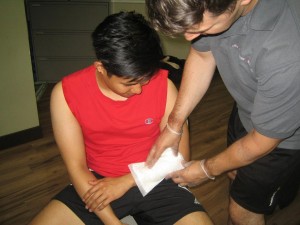It is important to note that hypovolemia develops once the body has lost a large amount of blood or bodily fluids in which it could no longer support normal circulation and bodily functions. Even though hypovolemia has various causes, the main treatment involves the replacement of blood or fluid that has been lost. Hypovolemia is considered as a medical emergency. If the condition is not treated promptly, it can lead to hypovolemic shock which is a serious condition that can lead to organ failure and even death. It is best that you are prepared with what to do if hypovolemia is suspected. All you have to do is to register for first aid training today.
Burns
Cases involving severe burns that cause substantial damage to the deep layers of the skin can affect the muscle and bone. The affected areas that are deep or involve a large part of the body can lead to hypovolemia. Always remember that the burned skin could not hold moisture and fluid. In some circumstances, the blood vessels are also damaged in which they could not supply and circulate blood properly. A reduction in the body fluid will cause the blood volume to drop which results to poor circulation and hypovolemia.

Hemorrhage
Always bear in mind that hemorrhage occurs once the body lost large amounts of blood. If one fifth of the blood volume in the body is lost, it can lead to hypovolemia. Take note that this can occur due to injury within the body or from the exterior such as trauma or certain conditions. Punctures or lacerations to the skin, veins, muscles and arteries can lead to hemorrhage. In some cases, a fractured femur or pelvis can cause significant bleeding. Even damaged organs or ulcers that are bleeding can also contribute to the quick loss of blood.
Hypothermia
Hypothermia develops once the core body temperature drops below 35 degrees Celsius. Take note that the core body temperature is taken rectally to determine the body temperature. When hypothermia develops, the body tends to lose more heat and it can lead to circulatory, neurological and respiratory functions to slow down.
Hypothermia can cause the blood vessels to constrict, thus disrupting the flow of blood and circulation. An individual with hypothermia requires immediate warming and administration of intravenous fluids to correct hypovolemia.
Diarrhea and vomiting
Conditions that affect the stomach and intestines can lead to hypovolemia. Severe cases of diarrhea and vomiting will drastically reduce the fluid level in the organs and tissues. An individual who is ill might not be able to consume fluids by mouth and replace lost fluids. In such circumstances, intravenous fluids specifically normal saline can help restore the fluid balance as well as minimize the risk of hypovolemia.
